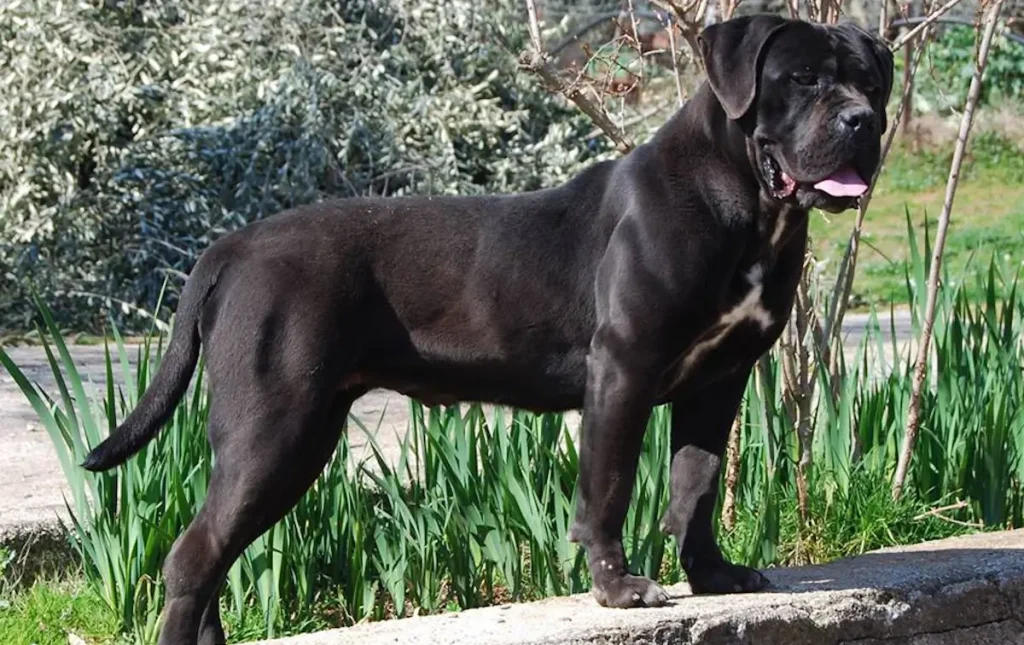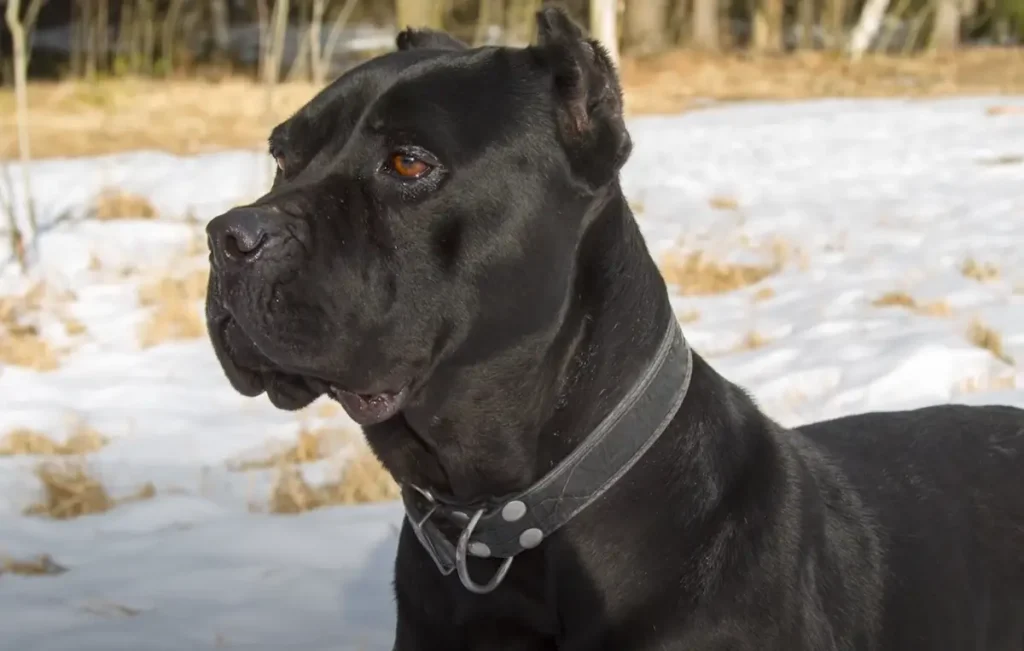As you know, every dog has its day, but the Cane Corso’s blend of nobility and strength ensures its days are marked with distinction. This Italian mastiff’s characteristics embody a unique balance of power and grace, making it more than just a mere pet but a loyal guardian and affectionate family member.
If you’re considering bringing one into your home, you must understand this breed’s training, socialization, and exercise needs, which are as expansive as their lineage. The Cane Corso thrives on firm leadership and clear boundaries, so you must be equipped to establish yourself as the pack leader.
As we explore the depths of the Cane Corso’s temperament and the nuances of its care, you’ll learn how to harness the potential of this majestic breed, ensuring a harmonious bond that stands the test of time.
- Noise Level
- Energy
- Sociability
- Trainability
- Care
- Health
Overall
Summary
The Cane Corso is a moderately noisy breed with high energy levels. They are moderately sociable and trainable, requiring moderate care and maintaining good health.
Cane Corso: Traits, Temperament, and Care Guide
Delving into the traits and temperament of the Cane Corso, you’ll find that this breed embodies a unique blend of strength, loyalty, and sensitivity. This necessitates a comprehensive care guide to ensure their physical and emotional well-being.
As a large breed, the Cane Corso’s temperament requires proper training, early socialization, and consistent mental and physical stimulation. These factors are crucial in fostering a well-adjusted Italian Mastiff that’s both protective and affectionate.
Exploring the Characteristics of the Cane Corso
When considering the Cane Corso’s robust presence, it’s crucial to understand that their impressive physique is matched by an equally commanding personality, which thrives under consistent training and strong leadership.
| Aspect | Detail | Implication |
|---|---|---|
| Size | Large, muscular breed | Requires space, exercise |
| Temperament | Gentle giant, protective | Needs socialization |
| Health Concerns | Hip dysplasia, cancers | Demands preventive care |
| Role | Italian Mastiff, working dog | Strong bond with family |
Embracing a Cane Corso Breed means committing to their well-being, acknowledging the demands of large dogs, and mitigating health issues with care.
Cane Corso: A Comprehensive Profile and Guide
As you consider adding a Cane Corso to your family, it’s crucial to understand their significant exercise needs and potential health issues, such as hip dysplasia and gastric dilatation-volvulus.
You’ll need to prepare for the financial aspects of care, including the costs of proper fencing, grooming, and regular veterinary checkups.
Early socialization and training are non-negotiable to ensure your Cane Corso’s temperament aligns with their composed and dependable companion role.
Everything You Need to Know
If you’re considering owning a Cane Corso, this majestic Italian breed encompasses a unique blend of strength, intelligence, and loyalty. Understanding their distinct characteristics and needs is essential for a harmonious relationship.
- Cane Corso Temperament: Protective yet affectionate, requiring early socialization and training.
- Corso Care: Daily exercise and sturdy fencing are non-negotiable.
- Cane Corso Health: Watch for breed-specific issues; regular vet visits are crucial.
- Association Guidance: Consult the Cane Corso Association for responsible ownership practices.
Discovering the Temperament
When considering a Cane Corso as a pet, it’s crucial to understand their temperament. This powerful breed combines a reserved and quiet nature with a strong sense of loyalty and protection towards their family. Descended from Roman war dogs, the Cane Corso is gentle yet easy to train, given proper socialization. The American Temperament Test Society has acknowledged them for their stable temperament, which makes them affectionate and protective companions.

Cane Corso: Is It a Good Fit for Families?
When considering a Cane Corso as a family pet, you must weigh their natural guardian disposition against the potential challenges their size and strength present.
Their need for consistent exercise and solid fencing to contain their territorial instincts is non-negotiable, especially in a family environment.
Moreover, early socialization is crucial to ensure they coexist harmoniously with children, demanding your commitment to their proper upbringing.
Assessing Cane Corso’s Compatibility with Families and Kids
While the Cane Corso can form a strong bond with family members, it’s essential to thoroughly evaluate whether their size, strength, and exercise needs align with your household dynamics, especially if you have children.
- Socialization: Early and consistent socialization ensures they’re gentle with kids.
- Temperament: Assess their protective yet family-friendly nature.
- Activity Level: Active families may enjoy a Cane Corso’s energy.
- Space Considerations: Large dogs need ample room to thrive.
Cane Corso Flexibility
The Cane Corso’s flexibility as a breed extends to its ability to fulfill diverse roles, ranging from vigilant protection to compassionate therapy work. These dogs showcase their versatile nature in both professional settings and as family companions.
Despite their size, Italian Mastiffs adapt well to various living spaces, provided they receive ample exercise and mental stimulation.
With obedience training, they excel in socialization, even sporting a low-maintenance short coat.
Cane Corso Obedience Essentials
As you embark on obedience training for your Cane Corso, it’s crucial to start early and employ consistent, positive reinforcement techniques.
You’ll need to ensure thorough socialization and a structured exercise routine to prevent any behavioral issues arising from this powerful breed’s energy and intelligence.
Establishing yourself as a firm, calm leader is imperative, as Cane Corsos respond keenly to praise and rewards, helping to reinforce desired behaviors and maintain their well-being.
Effective Training Strategies
To maximize your Cane Corso’s potential, commence training early, utilizing positive reinforcement to shape their strong territorial instincts into obedient and friendly behavior.
| Strategy | Benefit |
|---|---|
| Positive Reinforcement | Fosters Trust |
| Socialization at a Young Age | Ensures Adaptability |
| Regular Exercise | Maintains Healthy Weight |
| Balanced Diet | Supports Growth |
| Ethical Breeding | Guarantees Good Health |
Exercise and Grooming Needs
Understanding the Cane Corso’s exercise and grooming requirements is crucial, since their high energy levels demand at least 30 minutes of daily activity and their coat needs minimal but consistent care.
As an active person, you’ll find that Corsos thrive with a sturdy routine, including weekly brushing and a controlled amount of food to maintain a healthy weight.
Your large, spirited companion requires a robust, active lifestyle to stay content and well-groomed.

Health Considerations for Cane Corso
As a Cane Corso owner, you must know that your dog is at risk for health issues such as hip dysplasia and certain cancers, making regular veterinary check-ups a non-negotiable part of their care.
Their large stature necessitates a meticulously balanced diet to avoid developmental bone problems linked to improper calcium levels, especially during growth phases.
Additionally, sustaining their mental and physical health through exercise and training can significantly extend their lifespan and improve their overall well-being.
Common Health Issues and Lifespan
Navigating the health landscape for Cane Corsos reveals a breed with a lifespan of 10 to 12 years. These dogs commonly face issues such as hip dysplasia and gastric dilatation-volvulus. While these conditions are inherited, they don’t negate the fact that Corsos are generally healthy dogs.
Your awareness and proactive care can reduce the risk of such ailments. Ensuring proper diet and regular check-ups maximizes the health benefits and longevity of your Cane Corso.
Is Cane Corso the Right Pet for You?
Considering a Cane Corso as your next pet requires careful reflection on whether their characteristics align with your lifestyle and ability to meet their needs.
Prospective corso owners need to know everything about the breed’s requirements. Ensure you can provide enough exercise, withstand financial commitments, and don’t let them suffer from separation.
Adopting a Cane means understanding corso needs deeply to ensure they’re a good fit for you.
Conclusion
In conclusion, embracing a Cane Corso means committing to an intelligent, powerful companion who thrives with proper care.
Interestingly, despite their size, proper training can make them gentle giants with over 80% responding well to early socialization.
Regular exercise and vigilant health monitoring are non-negotiables to mitigate common breed-specific ailments.
Analyze your lifestyle critically—only if it aligns with the Cane Corso’s needs should you consider this majestic breed as your new family member.
Frequently Asked Questions
What Is the Personality of the Italian Mastiff?
You’ll find Italian Mastiffs are loyal companions with protective instincts. Their intelligent guardianship, strong-willed nature, and affectionate behavior make them trainable. Remember, their dominant personality requires early socialization and consistent exercise to stay gentle giants.
What Is the Difference Between a Cane Corso and an Italian Mastiff?
You’re delving into the Mastiff world, where the Cane Corso’s lineage sets it apart from other Italian mastiffs. With distinct breed origins, it showcases a unique size, temperament, and historical roles.
What Is the Demeanor of an Italian Mastiff?
As a silent guardian, the Italian Mastiff displays a majestic presence with a calm yet intelligent demeanor. Its guarding instincts and family loyalty necessitate temperament testing, highlighting the importance of consistent training and socialization.
Why Are Cane Corso so Clingy?
Your Cane Corso’s clinginess stems from their guardian instinct and emotional sensitivity, causing separation anxiety. As loyal companions, they exhibit protective behavior, craving owner bonding and affection, highlighting training importance to manage their social dependency.
